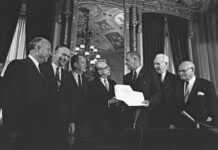 The Association for Enterprise Opportunity (AEO), a nonprofit organization dedicated to empowering microbusinesses, today announced the release of its new report “The Tapestry of Black Business Ownership in America: Untapped Opportunities for Success.” Funded by the W.K. Kellogg Foundation, the report set out to assess the economic strength and potential of Black-owned businesses, identify challenges and opportunities across a mosaic of segments, and launch a national discussion on how investors and policymakers can increase the effectiveness of programs designed to support Black entrepreneurship, keeping in mind that rich diversity.
The Association for Enterprise Opportunity (AEO), a nonprofit organization dedicated to empowering microbusinesses, today announced the release of its new report “The Tapestry of Black Business Ownership in America: Untapped Opportunities for Success.” Funded by the W.K. Kellogg Foundation, the report set out to assess the economic strength and potential of Black-owned businesses, identify challenges and opportunities across a mosaic of segments, and launch a national discussion on how investors and policymakers can increase the effectiveness of programs designed to support Black entrepreneurship, keeping in mind that rich diversity.“There is a myth that Black people aren’t motivated to start their own firms, and are pushed into business ownership mostly due to unemployment,” said AEO President and CEO Connie Evans. “Our findings show that in actuality, Black Americans have high entrepreneurial drive and the same motivations as other entrepreneurs, yet face three persistent barriers that operating together impede the establishment and growth of Black-owned firms. Understanding and addressing the unique interplay of these obstacles are crucial steps to unleashing the potential economic power of Black business ownership in America.”
The three barriers described in the report are a Wealth Gap, fewer assets and less disposable income to invest in business; a Credit Gap, decreased access to formal credit and high denial rates; and a Trust Gap, institutional bias that Blacks have experienced, inhibiting them from actions such as applying to financial institutions for more capital, joining networks, creating valuable partnerships, and more. This environment of scarcity translates into fewer establishments reaching maturity, and for those that do survive, limited potential to grow and hire. In fact, most businesses say the current financing environment hampers their ability to hire new employees.
The report’s authors calculated that if Black-owned firms were able to reach employment parity with all privately-held U.S. firms, 600,000 new jobs could be created and $55 billion would be added to the U.S. economy. Since many Black-owned businesses are small businesses that serve and hire from their communities, reaching employment parity could also have the effect of reducing unemployment in the Black community down to 5 percent. In addition, a larger portion of money spent at Main Street businesses stays circulating in the local region versus money spent at big box stores, creating economic empowerment in areas that likely need it the most.
“We know that when parents are economically stable, their children are best positioned for success in school and life,” said Carla Thompson Payton, vice president for program strategy at the W.K. Kellogg Foundation. “This study will help us better understand what’s working and what’s not working for Black business owners so we can create pathways to entrepreneurship to create stability for their families and strengthen their communities.”
The report also releases a proprietary analysis of longitudinal data that reveals faster wealth creation among people who become self-employed, proof of the viability of this pathway in achieving economic livelihood. “The gap in average wealth between Black and White adults decreases from a multiplier of 13 all the way down to 3, when you compare the wealth of business owners by race,” said Evans. “Business ownership is the great equalizer in American wealth disparity. Our report illustrates the rich diversity of Black-owned businesses that have often been characterized with a one size fits all model, and begins to reframe the conversation on how to devise creative solutions that propel their success.”
“The Tapestry of Black Business Ownership in America: Untapped Opportunities for Success” contains innovative data analyses from Robert Fairlie, Professor of Economics at the University of California, Santa Cruz; William J. Darity, Jr., Professor of Public Policy at Duke University; and Khai Zaw, a statistical research associate at Duke University. It also includes information curated from organizations such as the Census Bureau and Bureau of Labor Statistics, input from an expert panel of advisors, and surveys of business owners across the country. The full report is available on the AEO Web site at www.aeoworks.org.






